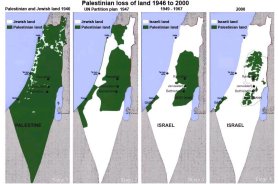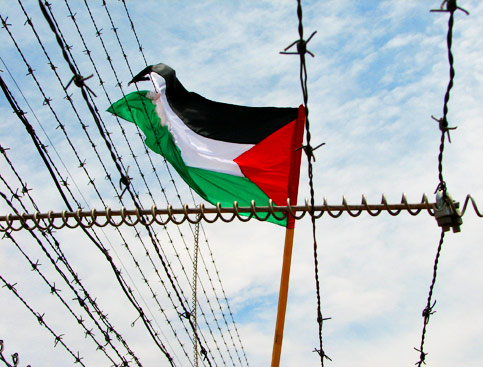How to deal with Zionism: oppose, expose, dispose

By Tariq Shadid – Now that the ‘Oslo peace process’ is clinically dead, the struggle of the Palestinian people is finding its way back to its original purpose: opposing the inherently racist power structure of Zionism. In terms of strategic approach this can be summarized in the ‘three poses against Zionism’: oppose, expose and dispose.
From politicians to people
The 21st century has seen a steady growth of grassroots support for the Palestinian cause in the international community. No other cause in recent history has proved capable of causing masses of ordinary citizens to show such determination and dedication as they have been doing in large-scale worldwide campaigns such as the various Freedom Flotillas, the BDS (Boycott, Divestment and Sanctions) campaign, social media activism, and many other forms of resistance.
As the support of ordinary citizens grew, the engagement of politicians worldwide declined at an equal pace. When the ‘two-state solution’ dynamics lost their appeal by failing to produce any tangible results on the ground, the incentive for public figures and politicians to portray themselves as ‘saviours” and ‘peace doves’ reaching out to ‘both sides’ diminished, especially in Western countries. Other issues moved up on the priority lists of their agendas, and the Palestinian issue was moved down on it.
 ‘Progressive’ Zionism is still Zionism
‘Progressive’ Zionism is still Zionism
The main ideological motor – from a Western perspective – for creating a body of support among Western populations for an Oslo-style ‘Peace of the Brave’ drew its fuel mostly from the rhetoric of ‘progressive’ and ‘left wing’ Zionists. The essential purpose of this drive was to make sure that 1948-confiscated territories of Palestine were firmly recognized (not only on a political level, but in public perception) as the state of ‘Israel’. Nakba-denial is an essential ingredient of this approach, and is still deeply entrenched in the views of many people in the West. It is even widespread among those who actively oppose the occupation of 1967-acquired territories of Palestine. After all, denial of the Nakba is closely interwoven with opposition to the Right of Return of 1948 Palestinian refugees to their homeland.
There is hardly any need for quotes on these matters, since ‘progressive’ Zionists barely ever hide the fact that their motivation for opposing the 1967 occupation is based on their urge to preserve the Zionist occupation of 1948, which in their own terminology is called the state of ‘Israel’. To provide an example nonetheless, the mission statement of EAJG (Een Ander Joods Geluid), the Dutch branch of ‘A Different Jewish Voice’, formulates it as such: “… an organization that, because of its dedication to Israel, aims to encourage the political and critical debate about Israel and Palestine.” This statement was translated from Dutch, from the profile of their Twitter-account.
 World Bank: nail in the coffin
World Bank: nail in the coffin
It could have been argued simply from looking at the changes in the map of Israeli control of Palestine, that no two state solution can ever be successfully brought about through negotiations, if ‘Israel’ at the same time is allowed to engage in its ongoing brazen expansionism. This has been going on all the time: from 1993 when the so-called ‘Peace Process’ was started, ‘Israel’ has managed to triple its settler population in the West Bank and East Jerusalem. Recent damning statements from the World Bank, indicating that no viable state can be set up in the Palestinian territories under the current circumstances, have brought even the ever-optimistic Prime Minister of the ‘Palestinian Authority’, Salam Fayyad, to despair. In an interview with The Independent, published on July 26th, he stated: “The cause of the Palestinians has never been more marginalized than it is today”.
This dire situation is strongly indicative of developments we have been seeing in the past years: even though the PA was set up as an instrument to control the Palestinian population living under occupation, under the pretext of laying the basis for a future Palestinian state, superpowers today are showing little to no interest in actually making this happen. To the Zionists and their supporters, it suffices that the PA engages in policing the Palestinians, and allowing the Israeli army and intelligence to raid Palestinian homes throughout the territory at will. These raids and arrests are, without exaggeration, a daily occurrence. The only reason that Western powers are not labeling the PA as a ‘sinking ship’ just yet, appears to be that they are not yet ready to have it give up its role of policing the Palestinians living under Israeli occupation.
Making up the balance
In other words, the so-called Peace Process, a phantom from its very inception, is dead, buried and gone. Is this a shock to the progressive Zionists who were propagating it? Hardly, since their main goal, the preservation of the state of ‘Israel’, remains untouched by these events. If you have any doubts about these seemingly bold statements, go ahead and perform some litmus tests. Ask them about the Right of Return of the Palestinians, and you will not get a straightforward message of support for it. Ask them what should be the future of Ma’ale Adumim, and you will not get a short answer (except perhaps in some instances, stating that Ma’ale Adumim should be maintained). Also, ask them what should happen to occupied East Jerusalem. Be very aware not to confuse these groups with those of anti-Zionist Jews, who do not share their views, although their numbers are hardly of any major significance in today’s political spectrum.
Is the demise of the two-state solution a shock to the Palestinians? To many of them, it is. Having bargained on hopes based on false promises, having nurtured genuine expectations of seeing an independent Palestinian state rise from the ashes of occupation, to many of them such a disillusion is quite a bitter pill to swallow. It would however be wrong to assume that the vast majority of Palestinians living under Israeli occupation were so gullible that they did not see through the charade from the beginning. Before Oslo, barely anyone was a ‘two-stater’: the overwhelming majority of Palestinians knew that Zionism is the racist power structure that they are up against, destructive in all of its forms, and not a trustworthy ‘partner’ in any type of negotiations. The most likely result of the treacherous manner in which the West is helping ‘Israel’ to wrap up the ‘two-state dream’, is that Palestinians will pick up the struggle where it was left off, namely as a struggle against the racist ideology of Zionism, and against its adherents.
Anti-Zionism: oppose, expose, dispose

Of course, this is already happening. Even grass-roots supporters of the Palestinian cause in the West are abandoning the Zionist-fed tenets of the two-state fallacy. You can see it in the rhetoric of BDS-activists, you can see it in the growing world-wide support for Nakba commemorations, and you can see it in the way that people are starting to realize that the relevant history of the Palestinian struggle did not start in 1993, nor in 1967, but before 1948.
There is a fresh new wind blowing in the ranks of Palestine supporters all over the world. Less and less people are turning towards ‘leftist’ and ‘progressive’ Zionists to learn about the struggle of the Palestinians: they are discovering that there are hundreds of Palestinian writers, speakers and debaters who are worth listening to. Social media like Twitter and Facebook have played a crucial role in emancipating the voices of these Palestinians and bringing them close to their Western counterparts. Activists worldwide are no longer mindlessly gobbling up the works of Uri Avnery, Gideon Levy and Michael Warschawski; they are digging into Palestinian culture, and exploring its richness, its undeniable identity, and its refreshing diversity. Projects like ‘Beyond Compromise‘ play an important role in empowering Palestinian voices, and their message is reaching the hearts and minds of Western pro-Palestine activists.
There is, and there will always be, a struggle against racism in this world. One of the most powerful forms of institutionalized racism alive today is Zionism. Its main targets are the Palestinians, and they are claiming a leading role in the struggle against it. As time goes by, this message is being heard by activists in the West, and colonialist-style paternalist attitudes that echo the words of ‘progressive Zionists’ in dictating to the Palestinians how to define their goals and wage their struggle, are making way for true and genuine solidarity. They are moving away from seeing the Palestinians as a problem for ‘Israel’, towards seeing that Zionism – embodied by its racist militaristic state – is the real problem. Together with the Palestinians, they are focusing their aims on Zionism: to oppose it and expose it, until it can be disposed of. Racist systems have a habit of falling out of grace over time, and in the case of ‘Israel’, this is definitely happening.



Recent Comments